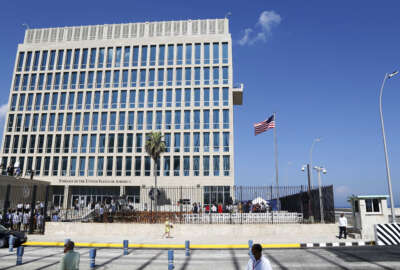
State Dept. names new coordinator on ‘Havana Syndrome’ cases
The State Department has named a new coordinator for its investigation into cases of so-called Havana Syndrome
WASHINGTON (AP) — The State Department on Friday named a new coordinator for its investigation into cases of so-called Havana Syndrome, responding to increased pressure from lawmakers to investigate and respond to hundreds of brain injuries reported by diplomats and intelligence officers.
Secretary of State Antony Blinken appointed a high-ranking deputy, Jonathan Moore, to coordinate the department’s task force on the cases. He replaces Pamela Spratlen, a retired diplomat temporarily called back into service by Blinken before leaving in September. She had faced criticism from some victims.
Blinken also appointed retired ambassador Margaret Uyehara to lead efforts to directly support care for State Department employees.
Investigators have been studying a growing number of reported cases by U.S. personnel around the world and whether they are caused by exposure to microwaves or other forms of directed energy. People affected have reported headaches, dizziness, nausea, and other symptoms consistent with traumatic brain injuries.
Possibilities under consideration include the usage of a surveillance tool or a device intended to harm. The cases are known as “Havana Syndrome” dating to a series of reported brain injuries in 2016 at the U.S. Embassy in Cuba.
After years of investigation, the U.S. government has still not publicly identified what or who might be behind the incidents or whether they are, in fact, attacks. But leaders in the State and Defense departments and at the CIA have pushed employees to report possible brain injuries and in some cases removed leaders who were seen as unsympathetic to the cases.
“This is about the health and security of our people and there’s nothing we take more seriously,” Blinken said Friday.
Several hundred cases are under investigation. There have been multiple reports in recent weeks of potential incidents linked to visits by high-profile U.S. officials, including a case involving a member of CIA Director William Burns’ traveling party in India and incidents at the U.S. Embassy in Bogotá, Colombia, prior to a visit by Blinken.
The State Department said Friday that Deputy Secretary Brian McKeon had met with diplomats in Vienna to discuss possible cases reported this year in Austria. The department said it had taken a “number of important steps, none of which we can detail publicly, to protect our personnel.”
Both Democrats and Republicans have pressed President Joe Biden’s administration to determine who and what might be responsible for the cases and improve treatment for victims, many of whom have long said government officials aren’t taking their cases seriously. Biden earlier this month signed a bill intended to improve medical care for victims.
Sen. Jeanne Shaheen, D-N.H., said at a recent hearing that after speaking to victims, there was still “clearly a disconnect as to what is happening at the top levels of the State Department and how victims are being treated in some cases.”
Shaheen has introduced new legislation to fix what she described as differences in how various agencies are investigating and treating cases.
“There’s still not enough information that’s being shared, not enough coordination that’s being done,” she said in an interview. “There’s not a unanimity of response on how to deal with it.”
CIA Director Burns, pressed on Havana Syndrome cases at a separate hearing last week, noted that the agency’s investigation into the cases is led by a key leader responsible for the operation to find Osama Bin Laden. He did not refer to the cases as “attacks” after being asked by Rep. Eric Swalwell, D-Calif., whether he would use that word.
“We’ve worked very hard to improve care, the care that our officers and sometimes their family members deserve,” Burns said. “And we have mounted an extraordinarily vigorous effort to get to the bottom of the questions of who and what may be causing these as well.”
Dr. James Giordano, a scientist working on investigations into the cases, said the incidents were being viewed as “an intentional engagement” by a U.S. adversary or proxies, though he declined to specify suspected countries.
“Speaking about attribution at this point in time is a very delicate matter because of the intelligence, military, and political ramifications,” said Giordano, executive director of the Institute for Biodefense Research in Washington.
Writing for the Cipher Brief, a publication focused on intelligence, a group of former CIA officers said they had “few doubts” that Russia was responsible and expected the U.S. to eventually blame Moscow. The officers called for the U.S. to bolster its military presence in Eastern Europe, limit Russian business and tourist travel, and seek collective defense through NATO.
“For at least a decade, Russia has conducted itself as in a state of conflict with the West in general and the United States in particular,” the group said.
Copyright © 2025 The Associated Press. All rights reserved. This website is not intended for users located within the European Economic Area.





